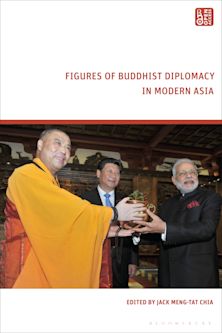- Home
- ACADEMIC
- History
- Asian History
- Why are we in Okinawa?
Why are we in Okinawa?
A History of Violence
Why are we in Okinawa?
A History of Violence
Payment for this pre-order will be taken when the item becomes available
- Delivery and returns info
-
Free CA delivery on orders $40 or over
You must sign in to add this item to your wishlist. Please sign in or create an account
Description
In this compelling history, award-winning journalist, Jon Mitchell, traces how the islands of Okinawa have been annexed by Japan, occupied by the United States and now menaced by China. In response, Okinawans have developed one of the world's most resilient – yet overlooked – pacifist movements.
Once a wealthy kingdom, Okinawa was seized by Japan in the late-19th century and, after World War II, abandoned to US colonial rule. For twenty-seven years, residents were denied civil and labor rights, but their non-violent resistance grew so strong that, in 1972, they forced the return of the islands to Japanese control.
Today, thirty-one US bases dominate a land mass smaller than Rhode Island and Okinawans remain Japan's poorest people. Tensions are rising as China questions Japan's control of Okinawa and fires missiles into nearby seas. Angry at being pawns in the play of greater powers, islanders resist through mass protests, music, comedy and art. Okinawa offers an inspirational model of grassroots democracy and civic engagement for the rest of Japan and beyond.
Table of Contents
An Introduction
1. The Ryukyu Kingdom: A Bridge of Nations
2. Disposal, Discrimination, and Diaspora
3. The Storm of Iron
4. Forgotten Island
5. Showcases of Democracy
6. The Vietnam War in Okinawa
7. Reversion
8. Broken Promises
9. Relieving the Burden
10. All Okinawa vs. Japan and the United States
11. Islands of Peace?
Coda: So Why Are We Really in Okinawa?
Product details

| Published | Feb 19 2026 |
|---|---|
| Format | Hardback |
| Edition | 1st |
| Extent | 288 |
| ISBN | 9781538188392 |
| Imprint | Bloomsbury Academic |
| Illustrations | 15 b&w images, 2 maps |
| Dimensions | 229 x 152 mm |
| Series | Asian Voices |
| Publisher | Bloomsbury Publishing |
About the contributors
Reviews
-
In Why Are We in Okinawa?, Jon Mitchell wields the tools of investigative journalism with precision and grace, exposing a century and a half of military secrecy, exploitation, and abuse. Mitchell gathers facts as one might gather flowers, which is to say with quiet devotion. This book is a gift - first and foremost to the people of Okinawa, who have endured unspeakable violence and suffer mightily still, but also to all of us stubborn enough to believe that this broken world is still worth saving.
Julian Aguon, No Country for Eight-Spot Butterflies: A Lyric Essay
-
The people of Okinawa, whose lives are endangered by the excessive burden of military bases imposed through joint colonization by Japan and the United States, have long raised their voices as a means of survival. Jon Mitchell's reporting has been a strong driving force in this struggle. His distinguished research and data collection have revealed the truths that the authorities have concealed in order to maintain the bases, and the voices that have gone unheard. With this book, readers will witness Okinawans' tormented historical experiences along with their unwavering determination and refusal to give up. For Okinawans who continue to fight – even though they sometimes feel alone – this book offers guidance like the North Star or Ninufabushi, which helped ancient Ryukyu sailors to traverse the oceans. It connects the people of Okinawa with others around the world.
Naomi Jahana, University of the Ryukyus, Japan
-
A remarkable, page-turning book, based in sources unearthed from the US government, Why Are We in Okinawa? is a must-read for anyone concerned with justice movements, geopolitics in Asia and the Pacific, and US military policy and behavior. It details the devastating effects and future risk of the US military occupation of Okinawa for its people, as well as the islanders' deeply inspiring resistance over many decades.
Catherine Lutz, Co-founder of the Costs of War project




































